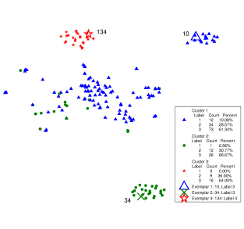FIT
2011 - 2015

Intelligente Tutorensysteme (ITSs) haben in den letzten 20 Jahren bemerkenswerte Fortschritte gemacht. Ein ITS benötigt allerdings üblicherweise exakte Domänenmodelle und pädagogische Modelle, welche die Reaktion eines menschlichen Tutors auf Fehler von Lernenden repräsentieren. Daher sind ITS-Systeme typischwerweise auf größere Anwendungskontexte in Domänen beschränkt, bei denen die erforderliche Formaliserung überhaupt möglich ist und sich der erhebliche Aufwand rentiert. In anderen Anwendungsfeldern (so-genannten ill-defined domains) sind menschliche Tutoren ITS-Systemen (sofern diese überhaupt existieren) deutlich überlegen. Das Ziel des FIT-Projektes war es, neue Formen von ITS-Methoden zu entwickeln, die auch in ill-defined domains mit realistischem Entwicklungsaufwand anwendbar sind. Ansatz waren hier autonome maschinelle Lernverfahren, welche aus gegebenen Daten (z.B. Lernerlösungen) Strukturen und Feedback-Möglichkeiten lernen. Hierzu sollten Prototypen-basierte Lernverfahren und neue Erweiterungen der Methoden für generelle nicht-Euklidische Strukturdaten so angepasst werden, dass sie gleichzeitig den Raum der Lernerlösungen strukturieren, geeignete Metriken für Strukturen adaptieren, gegebene Lernerlösungen mit bekannten Daten alignieren und basierend darauf geeignetes Feedback inferieren können. Die Lernverfahren wurden für komplett unüberwachte Szenarien und solche mit nur partieller Annotation entwickelt, um den Gegebenheiten von ITSs in ill-defined domains Rechnung zu tragen.
Personen
- Prof. Dr. Niels Pinkwart
- Dipl.-Wirt.-Inf. Sebastian Groß (ehemalige(r) Mitarbeiter(in))
Bilder

Veröffentlichungen
Publications with the keyword "fit"
Comparison of Feedback Strategies for Supporting Programming Learning in Integrated Development Environments (IDEs)
Advanced Computational Methods for Knowledge Engineering: Proceedings of the 5th International Conference on Computer Science, Applied Mathematics and Applications, ICCSAMA 2017, Springer International Publishing, 2017, ISBN 978-3-319-61911-8
dynafit fit
DOI, ISBN, RIS, BibTex
Orientation and Navigation Support in Resource Spaces Using Hierarchical Visualizations
i-com, 16(1), 2017
dynafit fit
DOI, RIS, BibTex
Konzept-Lernressourcen-Beziehungen als Unterstützung von Selbstreflexion in einem Learning-Analytics-Werkzeug
Proceedings der Pre-Conference-Workshops der 14. E-Learning Fachtagung Informatik co-located with 14th e-Learning Conference of the German Computer Society (DeLFI 2016), CEUR Workshop Proceedings (CEUR-WS.org), 2016
dynafit fit learning analytics werkzeug lernressource visualisierung konzept
URL, RIS, BibTex
Ressourcenorientierte Visualisierungen als Learning-Analytics-Werkzeuge für Lehrende und Lerner
Proceedings of DeLFI Workshops 2015 co-located with 13th e-Learning Conference of the German Computer Society (DeLFI 2015), CEUR Workshop Proceedings (CEUR-WS.org), 2015
dynafit fit learning analytics werkzeug lernressource visualisierung konzept
URL, RIS, BibTex
How Do Learners Behave in Help-Seeking When Given a Choice?
Artificial Intelligence in Education, Springer International Publishing, 2015, ISBN 978-3-319-19772-2
fit intelligent tutoring system help-seeking feedback choice
DOI, ISBN, PDF, RIS, BibTex
Learning Feedback in Intelligent Tutoring Systems
KI - Künstliche Intelligenz, 2015
fit intelligent tutoring systems example-based feedback machine learning prototype-based clustering
DOI, PDF, RIS, BibTex
Towards an Integrative Learning Environment for Java Programming
IEEE 15th International Conference on Advanced Learning Technologies (ICALT), 2015, IEEE Computer Society Press, 2015
fit education java learning systems problem-solving programming environments programming profession java adaptive tutoring integrative learning environment programming
DOI, PDF, RIS, BibTex
How to Select an Example? A Comparison of Selection Strategies in Example-Based Learning
Proceedings of the 12th International Conference on Intelligent Tutoring Systems (ITS), Springer Verlag, 2014
fit
DOI, RIS, BibTex
Example-based feedback provision using structured solution spaces
International Journal of Learning Technology, 9(3), 2014
fit
DOI, PDF, RIS, BibTex
Domain-Independent Proximity Measures in Intelligent Tutoring Systems
Proceedings of the 6th International Conference on Educational Data Mining (EDM), 2013
fit
RIS, BibTex
Towards a Domain-Independent ITS Middleware Architecture
Proceedings of the 13th IEEE International Conference on Advanced Learning Technologies (ICALT), IEEE Computer Society Press, 2013
fit
DOI, RIS, BibTex
Towards Providing Feedback to Students in Absence of Formalized Domain Models
Proceedings of the 16th International Conference on Artificial Intelligence in Education (AIED), Springer Verlag, 2013
fit
DOI, RIS, BibTex
Towards Learning Feedback in Intelligent Tutoring Systems by Clustering Spaces of Student Solutions
Proceedings of the 25th International Conference of the Florida Artificial Intelligence Research Society (FLAIRS), AAAI, 2012
fit
PDF, RIS, BibTex
How to Quantitatively Compare Data Dissimilarities for Unsupervised Machine Learning?
Proceedings of the 5th International Workshop on Artificial Neural Networks in Pattern Recognition (ANNPR), Springer Verlag, 2012
fit
PDF, RIS, BibTex
Cluster Based Feedback Provision Strategies in Intelligent Tutoring Systems
Proceedings of the 11th International Conference on Intelligent Tutoring Systems (ITS), Springer Verlag, 2012
fit
PDF, RIS, BibTex
Feedback Provision Strategies in Intelligent Tutoring Systems Based on Clustered Solution Spaces
Tagungsband der 10. e-Learning Fachtagung Informatik (DeLFI), GI, 2012
fit
PDF, RIS, BibTex
